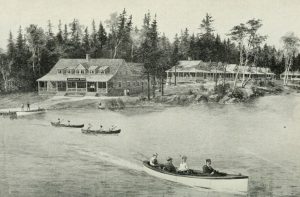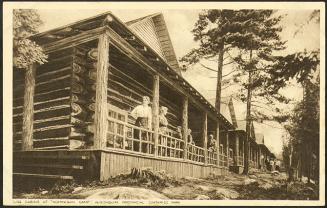MERCY FLIGHT, CIRCA 1918 July 4, 1973
This can hardly be called a mercy flight, as there were no planes around, but a well managed train and canoe trip no doubt saved two lives.
It was 1918. Nominigan Camp on Smoke Lake was full of guests and as most of them were yearly visitors, everyone was having a good summer. Nominigan Camp was run by the C.N.R., along with Minnising Camp on Big Island Lake, and the main hotel, Highland Inn on Cache Lake.

One of the guests was an American lady, who along with her husband and ten year old son occupied one of the cottages. The lady was also expecting a baby, but they liked Algonquin Park so much they felt they would be back home in plenty of time for the blessed event.
Also among the guests was a doctor from St. Catherines, and he too had his family. The doctor later became Mayor of his little city, and his daughter married a famous oarsman, and they too had a son who made his mark rowing.
I do not know what happened but the lady took sick, this doctor was called, and he did not like what he found as birth was imminent and the unfortunate woman would need an operation.
Now there were no phones but somehow this doctor made arrangements for a special train to have a clear track with the necessary equipment and nurses.
Then headquarters was at Algonquin Park Station and there was a road of sorts that enabled a stage to get to Nominigan. But this would be slow, so the train was stopped at Joe Lake, and the nurses and their equipment were taken in by canoe. At this time there was not a single outboard motor in the Park, so it meant paddling. Enough canoes were obtained so they would not need to portage between Canoe and Smoke Lake. When the party reached this portage more guides were waiting, and everything and everybody hurried to Smoke Lake, about one quarter of a mile, and there were more canoes with two guides in each for the final run to camp.
The doctor was prepared. The lights were acetylene gas, which if anyone remembers did not give a very bright light. There were no gasoline lanterns at that time, but all the flashlights had been gathered and several provided light for the operation.

A dining room table had been made ready and minutes after the nurses arrived things got underway. At the time I was away on a fishing trip.
The operation was a success, and I saw the baby as a boy six or seven years after. The doctor and his family continued to spend their summer holidays at Nominigan, until the camps closed, late in the twenties or early thirties. For a few summers the incident was a favourite topic of conversation.
Just before the last war this doctor made a trip to Algonquin Park. Then he came all the way by car, and he wanted to see Nominigan Camp. He was accompanied by his daughter, and it befell my good luck to take him by canoe and portage from Cache Lake to Smoke Lake. The camp was privately owned, as it had been sold after a fire destroyed the cottages. He was even then a bit dismayed at the changes taking place following the building of the road. I wonder what he would think now?
